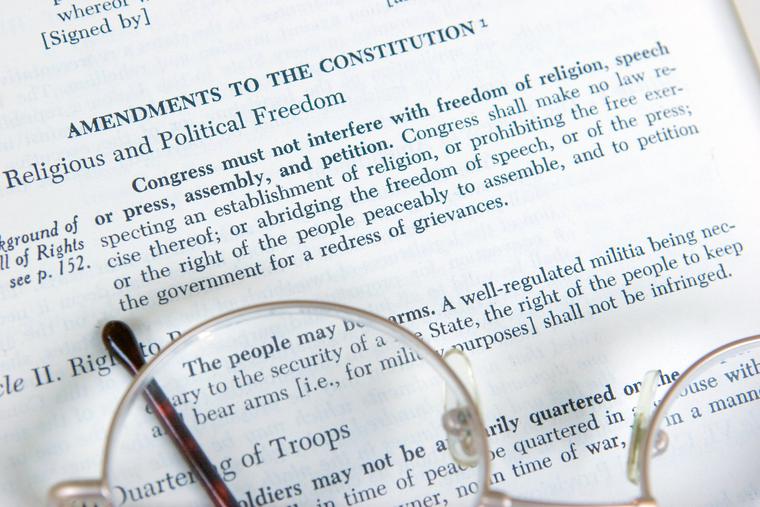US Constitution’s 9 Protectors From COVID Overreach
COMMENTARY: It’s looking as if only nine people can stop the First Amendment being torn up in front of your eyes.

Ever since the coronavirus pandemic began, public officials in several states have been overreaching — and that’s putting it politely. The United States of America faces its most serious public-health crisis in living memory, and what do they do? They make life difficult for people of faith.
First, some elected officials targeted religious gatherings when exercising their executive authority. For reasons we’ll come to in a minute, that didn’t quite work out for them. And now some of them have their eyes set on closing religious schools, once again allowing the virus to overcome good governance. It’s looking as if only nine people can stop the First Amendment being torn up in front of your eyes — and those people, as you’ll probably have guessed, are the justices of the Supreme Court.
Let me remind you what happened in early October. New York Gov. Andrew Cuomo issued an executive order placing strict attendance limits on houses of worship in certain areas of the state. It was an outrageous assault on freedom of religion, and both Catholics and ultra-Orthodox Jews decided to fight back.
They took the fight to the Supreme Court, which on the eve of Thanksgiving tore apart Cuomo’s sinister new regulations. Recognizing that while judges are not public-health experts, the Court observed that, “even in a pandemic, the Constitution cannot be put away and forgotten.”
Since the Cuomo orders singled out houses of worship, they were subject to exacting judicial scrutiny. This meant that they had to be narrowly tailored to serve a compelling state interest. “Stemming the spread of COVID-19 is unquestionably a compelling interest,” wrote the Court in a per curiam opinion, adding, “but there are many other less restrictive rules that could be adopted to minimize the risk to those attending religious services.” And so the Cuomo orders fell — at least for now. Lower appellate courts have also now stopped restrictions on religious gatherings imposed by California Gov. Gavin Newsom and Nevada Gov. Steve Sisolak.
Alas, America’s religious believers are being forced to continue mounting legal challenges. Danville Christian Academy, a preschool-to-grade-12 private school, objected to Kentucky Gov. Andrew Beshear’s Nov. 18 order to end in-person instruction at all public and private elementary, middle and high schools in the state — while, you guessed it, allowing many secular activities and indoor gatherings, including gyms and movie theaters, to continue under more lax rules.
The school, joined by the Commonwealth of Kentucky through its attorney general, filed a lawsuit and sought an emergency hearing and temporary restraining order. A lower court sided with them and ordered Beshear to stop enforcing the order “on in-person instruction with respect to any religious private school in Kentucky that adheres to applicable social distancing and hygiene guidelines.” (It’s worth noting that Danville Christian has been following a detailed hygiene and social-distancing policy that was approved by the local health authority.) Beshear appealed the order. The Court of Appeals for the 6th Circuit vacated the lower court’s order. Since the Beshear order shut down all schools, the panel asserted, it did not discriminate based on religion.
Danville Christian Academy and the state’s attorney general filed papers with Supreme Court Justice Brett Kavanaugh asking for emergency relief or review by the full Court. They made a compelling argument: Once the state starts handing out less restrictive rules to a “favored class” of secular conduct, it must justify its decision not to favor religious establishments.
How this case should have turned out in its merits is straightforward. The “very severe restrictions on attendance at religious services” under the Cuomo orders pale in comparison to the Beshear order, which closes religious schools to all of their students. And as the Court recognized in Our Lady of Guadalupe v. Morrisey-Berru this past summer, religious schools are just as vital to many faiths in the United States as religious worship itself. Further, as pointed out by the powerhouse religious liberty law firm Becket in an amicus brief to the Supreme Court, the First Amendment also protects the right of parents to direct the religious upbringing and education of their children.
Disappointingly, the Court, in an order issued Dec. 17, refused to step in. For now. “The Governor’s school-closing Order effectively expires this week or shortly thereafter, and there is no indication that it will be renewed,” seven justices asserted. Two justices, however, were not willing to back away so easily. Justice Samuel Alito, in a dissent, critiqued the Court’s order as “based primarily on timing.” And Justice Neil Gorsuch eviscerated the lower appellate court’s decision to let Beshear’s order stand. If there is any silver lining for religious-school children in Kentucky, it is that the Court’s refusal to stop the Beshear order was “without prejudice.” This means that the school or any other parties can go back to court if Beshear issues a new school-closing order for the coming new year, in which case there may well be a majority on the Court that takes Alito’s and Gorsuch’s position. The Court’s willingness to take a critical look at school-closure orders in the future if need be is critical, as Catholic high schools in Michigan are also seeking judicial relief from a similar school-closure order issued by Gov. Gretchen Whitmer.
Appalling orders like those issued by Cuomo and Beshear strike at the heart of religious freedom at a time when faith is so vital for many Americans and their families. Those state officials determined to overreach by shutting down religious schools following health-and-safety guidelines will most certainly face pushback in federal court. If any of these cases reach the country’s highest court, nine justices must courageously apply Court precedent that “the Constitution cannot be put away and forgotten.” Not even in a pandemic.
Editor’s Note: This commentary was updated Dec. 18 online to reflect the latest news.














